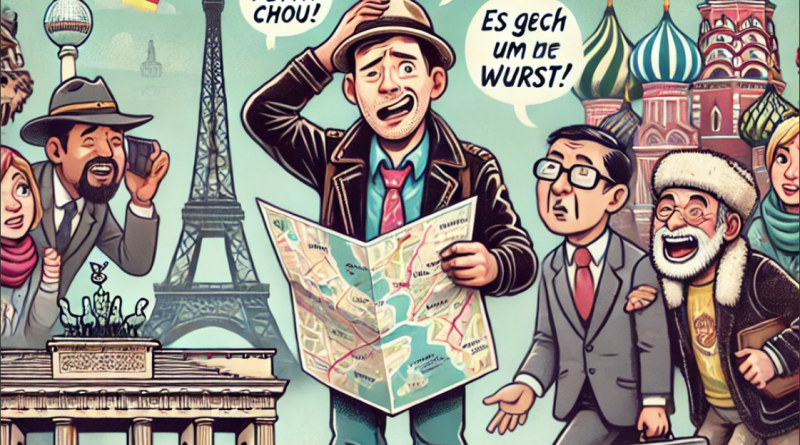Going In Too Deep: A Journey of Unfortunate Innuendos Across Europe
Liam was a seasoned traveler, the kind who loved to learn a little bit of the local language before venturing into new lands. He believed this helped him connect with locals and find the best experiences. What he didn’t realize, though, was how some phrases carried a weight that went beyond their literal meanings. His latest trip was a whirlwind tour across Europe, starting in France and ending in Russia, and it was bound to be unforgettable—but not for the reasons he expected.
France: “Mon Petit Chou”
Liam had just arrived in Paris and was determined to charm the locals with his basic French. At a bakery, he ordered a croissant and, as the cashier handed it over, Liam smiled and said, “Merci, mon petit chou.” He meant it as a cute, friendly gesture—after all, it translated to “my little cabbage,” a term of endearment, right?
The cashier blinked. Then her cheeks flushed. She giggled nervously and handed him his change without saying a word. As Liam left, he caught a glimpse of her whispering to a co-worker, who also burst into laughter. He shrugged. Maybe she just thought he had a cute accent.
Germany: “Es geht um die Wurst”
In Berlin, Liam found himself in a heated discussion about local politics with a group of students at a café. They seemed impressed that he could keep up with the conversation. As the debate grew more intense, Liam leaned in and said, “Es geht um die Wurst!”—a phrase he had learned meant “it’s about the sausage,” or, in English, “it’s high stakes.”
The table went quiet for a moment. One of the girls snickered, and the guy next to him gave him a knowing look. “Really? Sausage?” the guy asked, his voice dripping with irony.
Liam blinked, suddenly realizing that, yes, “sausage” might have a certain connotation. He laughed it off, but from then on, they seemed to treat him as if he were just another Casanova looking for a good time.
Netherlands: “Lekker Ding”
Next stop: Amsterdam. It was a sunny afternoon when Liam rented a bike and, after a long ride through the canals, found a lovely little café. As the waitress brought him his coffee, he decided to compliment her cheerful demeanor. “Dank je, lekker ding!” he said, remembering that “lekker ding” meant “tasty thing” in Dutch.
Her eyebrows shot up, and a bemused smile spread across her face. “Oh, you think I’m a ‘lekker ding,’ huh?” she asked, crossing her arms.
Liam gulped. “Uh, yes, like—uh, tasty… you know, like this coffee,” he stammered, holding up his cup as if it would save him.
She chuckled and winked as she walked away, leaving him red-faced.
Czech Republic: “Zadek”
Prague was breathtaking, and Liam couldn’t wait to visit the historic castle. After a long day of exploring, he decided to treat himself to a traditional Czech meal. While waiting for his food, he tried to chat with the waitress. She asked him about his trip, and he tried to explain that after all the walking, his “zadek” hurt, meaning his butt.
The waitress’s eyes widened for a second, then she burst out laughing. “Zadek? Really?” she teased, before heading back to the kitchen.
Confused, Liam sat back and wondered if maybe the Czechs just found everything funny. It wasn’t until later that he learned “zadek” was not just “butt” but also a somewhat cheeky way to talk about it.
Denmark: “Slikke”
In Copenhagen, Liam was wandering through a street food market when he noticed a stall selling Danish pastries. He ordered a cinnamon roll and, recalling that “slikke” meant “to lick,” he tried to explain to the vendor how much he loved to “slikke” the frosting off pastries.
The vendor raised an eyebrow and smirked. “Slikke, huh? Sounds like you’re talking about more than frosting, mate,” he said, winking.
Once again, Liam felt the familiar burn of embarrassment creeping up his neck.
Sweden: “Sätta På”
In Stockholm, Liam found himself in an electronics store, shopping for a new phone charger. He approached an employee and, thinking he knew the Swedish phrase for “turn on,” he confidently said, “Kan du sätta på min telefon?”
The employee blinked. A slow smile spread across his face. “Sätta på, you say?” he asked.
Liam nodded. “Yes, turn on… right?”
“Well, technically, yes,” the employee said, “but it also means… you know… to ‘have sex.’” He winked.
Liam wanted to disappear.
Norway: “Rumpe”
By the time Liam reached Oslo, he was starting to second-guess every phrase he had learned. After a long hike, he met a friendly local at a scenic viewpoint. Trying to blend in, Liam chatted about how breathtaking the views were, adding, “Norwegian women must have strong legs and nice rumpe from all this hiking!”
The man raised an eyebrow, barely holding back laughter. “Well, I can’t speak for everyone, but… thanks?” he said, looking incredibly amused.
Liam’s face turned bright red. “I just meant… you know, hiking and all…”
The man patted him on the back, still chuckling. “I’m sure the women will appreciate your… appreciation of their hiking skills.”
Liam vowed never to use the word “rumpe” again.
Finland: “Panna”
Liam’s next stop was Helsinki. He visited a cozy bar and ended up chatting with a friendly group of locals. After a few drinks, one of them asked if Liam had tried Finnish pancakes yet. In an attempt to show off his Finnish skills, Liam declared, “I’d love to panna some pancakes!”
The table went silent. One of them started snickering, while another coughed into his drink. It wasn’t until later that he realized “panna” wasn’t just “to put”—it was also a common slang for “having sex.”
Romania: “Băga Mare”
In Bucharest, Liam tried to join a gym to stay fit on the road. He thought he’d encourage his new gym buddy by saying, “Let’s băga mare!” (literally “go big” or “push hard”). His new friend looked at him with raised eyebrows.
“That’s what you want, huh? Băga mare?” the guy asked with a smirk, making Liam realize the phrase might have sounded a little… too enthusiastic.
Poland: “Na Ostro”
While dining in Warsaw, Liam asked the waitress for a dish with extra spice. “Lubię to na ostro,” he said, smiling. The waitress gave him a mischievous grin. “Na ostro, huh? You like it rough?”
Liam groaned inwardly. Why did everything he say come out wrong?
Bulgaria: “Парче”
In Sofia, while buying souvenirs, Liam tried to compliment the shopkeeper by saying, “Ти си парче!” He thought he was calling her a “piece,” meaning she was amazing. Instead, the shopkeeper blushed and smiled slyly. “Oh, I’m a ‘piece,’ am I?”
Liam shook his head. Another misunderstanding.
Russia: “Я тебя поимею”
Liam’s final stop was Moscow. He was in a crowded bar, trying to tell someone he “had” a spot at the bar for them. Using his basic Russian, he confidently said, “Я тебя поимею,” believing it meant something like “I’ll save it for you.”
The group around him fell into a stunned silence before one guy burst into laughter. “Dude, you just said you’re going to… ‘have them.’”
Liam buried his face in his hands. He was done.
Conclusion
By the time Liam returned home, he was convinced his language skills had caused more chaos than connection. Every phrase, every compliment, every innocent attempt to fit in had led to misunderstandings and suggestive innuendos. He made a mental note for his next trip: maybe just stick to “hello” and “thank you.”

